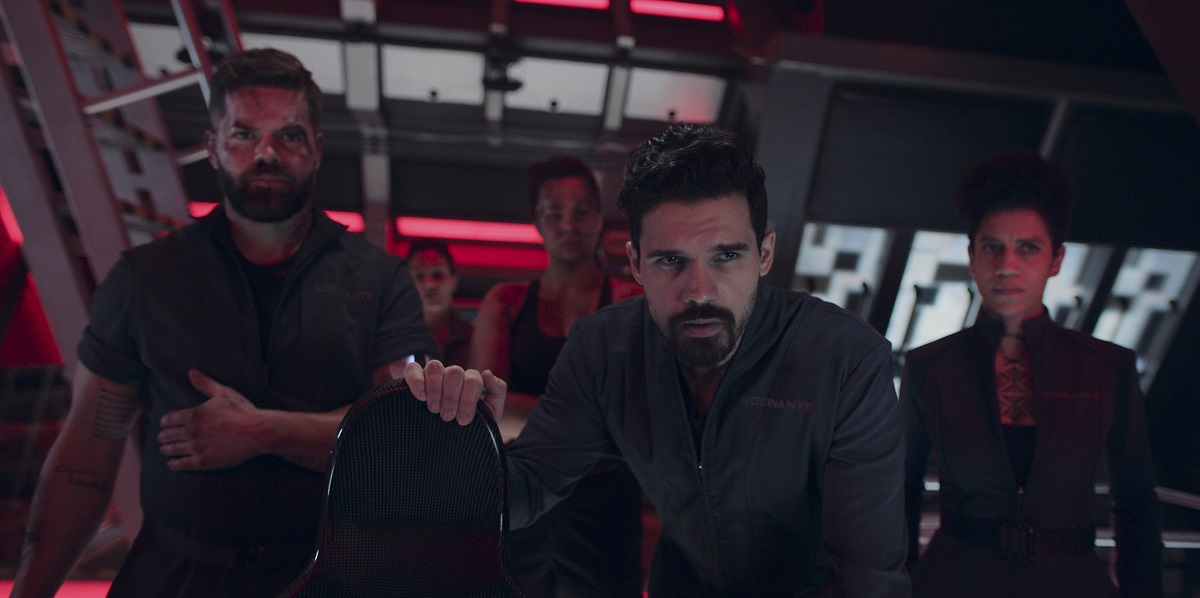We expect space opera to be big—sprawling tales with enormous casts traversing untold star systems and encountering alien beasties beyond human ken. But Amazon Prime’s “The Expanse” took a much more intimate, grounded tack: what if we reached the stars, and brought all of our problems—xenophobia, class inequities, our innate knack for self-destruction—along with us?
The show, which premieres its sixth and final season on December 10th, never quite received the “‘Game of Thrones’ in space” accolades it was clearly gunning for. Hell, it even faced a shaky period of cancellation after its original home, SyFy, pulled the plug in its third season, due to flagging ratings and an undesirable deal with production company Alcon Entertainment (i.e. they could only make money off its initial airing when most people were streaming episodes the following day). But a rabid fan campaign, and the largesse of fellow space nerd Jeff Bezos, ensured its renewal on Amazon Prime for three further seasons.

The similarities to “Thrones” are apparent from the get-go, not the least of which because the series of books it’s based on is written by one of George R.R. Martin’s former assistants (Ty Franck, who writes the books with Daniel Abraham, who collectively go by the nom de plume James S.A. Corey). Like its fantasy equivalent, “The Expanse” takes a well-worn genre—space opera—and imbues it with raw, grounded political edge. Stories take place along disparate groups of characters in faraway places, occasionally intersecting when the stakes get high enough (and they frequently do).
“The Expanse” also sports some of the highest production values on television; the sets, effects, and cinematography are gorgeous, and the futuristic set design feels grounded in realism while also allowing for rare moments of grandeur.
Set 200 years in the future, “The Expanse” keeps its concerns largely confined to our solar system: humanity has expanded beyond an Earth virtually stripped of natural resources to see what plunder can be found in space. The Moon is fully colonized, as is Mars; the latter has built itself an independent military state single-mindedly dedicated to terraforming the planet, and has little love for what they see as the oppressive mother state of Earth.
But every capitalist society requires a beleaguered underclass, and “The Expanse” has that in the form of the “Belters,” people who’ve spent generations in space mining the asteroid belt and spinning them up to become inhabitable. Decades in zero-g have made their bones long and brittle, and they speak in a kind of space Creole that sounds silly at first (until you get used to it, and then it feels right as rain). They’re sick and tired of being ground under the boot heel of the “Inners” (Earth and Mars, the inner planets), and are fully primed for revolution. The whole system is a powder keg waiting to explode, and that’s before the introduction of a mysterious, blue alien material known as “protomolecule” arrives on the scene.

That’s the stage “The Expanse” laid out for its first season, which explored this fragile ecosystem through various characters with disparate allegiances. There’s Josephus Miller (Thomas Jane, sporting a fedora and floppy space haircut), a Belter detective of the classic mold who unravels a conspiracy surrounding a missing rich girl. There’s UN undersecretary Chrisjen Avasarala (Oscar nominee Shohreh Aghdashloo, with a mouth as filthy as her costumes are gorgeous), working every political angle to stave off war.
And don’t forget the surviving crew of the ice hauler Canterbury—led by Steven Strait’s reluctant do-gooder James Holden—on the run from sinister forces in their stolen Martian gunship they eventually name Rocinante (after Don Quixote’s horse).
Future seasons expand the cast, and the show’s scope, to suitably operatic effect. In season two, we get a glimpse of Mars’ stake in the fight through Martian Marine Bobbie Draper (Frankie Adams), who’ll grow to become a trusted ally of both Avasarala and the Roci crew. The internecine conflicts between various factions of the Belt play out through more moderate (David Strathairn’s Klaes Ashford, Cara Gee’s Camina Drummer) and radical (Jared Harris’ Anderson Dawes, Keon Alexander’s fanatical Marco Inaros) voices.
This is compounded by the protomolecule, the show’s sole concession to the fantastical, whose properties shift and change as it carries out its mercurial purpose. (Eventually, it builds an interstellar Ring near Uranus that permits transit to other unoccupied systems, leading to a new Gold Rush that widens humanity’s existing fractures.)
From the intricately-structured first episode, “The Expanse” lays out a lived-in sci-fi universe that embraces the real-world physics of space travel, and the ways those limitations can exacerbate existing human conflicts like resource distribution and political power. Ice and water are more valuable than gold, and a missing shipment in the Belt can lead to riots and rationing. Belter terrorists can be tortured simply by sending them to Earth to suffer in its more punishing gravity. Rising oceans and overpopulation on Earth have led to increasing demand for resources from space, further motivating humanity’s hope to maintain its stranglehold on the Belt.
That realistic approach makes for unique dramatic storytelling possibilities few shows of its type could imagine. Spaceships and stations don’t have artificial gravity; you’re either floating in zero-g, sticking to the floor with magnetic boots, or reacting to your ship’s thrust. (High-g maneuvers are a risky endeavor, and characters have even died from blacking out or having strokes if they aren’t pumped with the right drugs in their chairs.) There are no deflector shields—bullets and torpedoes rip holes out of your ship, and you, if you’re not careful. And if you do bite it in zero-g, your mag boots will just keep your dead body floating upright, swaying like blood-soaked algae on the ocean floor.

These narrative and dramatic constraints lead to “The Expanse” crafting some truly one-of-a-kind space battles, closer to submarine warfare than the pew-pew dogfights of “Star Wars.” Simply being in space is a volatile, dangerous thing, which makes these moments even more rewarding.
But for all the nail-biting shootouts and outer-space spectacle “The Expanse” traffics in, the show remains a surprisingly trenchant political thriller, continuing science fiction’s grand tradition of exploring contemporary problems in fantastical settings. The system is a fragile ecosystem of haves and have-nots, the ensuing tensions leading to stories that explore the ethics of terrorism, the vagaries of corporate greed, and the apocalyptic creep of climate change.
More than just the erstwhile protagonists of the series, the crew of the Rocinante represent the best hope humanity has for survival: Peaceful cooperation and coexistence. The four main members of the crew come from each major faction in the system: Earth (Holden and Wes Chatham’s bruiser mechanic Amos Burton), Mars (Cas Anvar’s happy-go-lucky pilot Alex Kamal), and the Belt (Dominique Tipper’s wily engineer Naomi Nagata). And yet, they operate independently as privateers, working with each faction in tandem depending on the job. They take on tasks as big as stopping Inaros’ Navy from hurtling asteroids at Earth, and as small as helping a botanist on Ganymede find his missing daughter.
In any other sci-fi show, they’d be blandly archetypal Big Damn Heroes; here, they scramble desperately to survive the swings and roundabouts of global politics, just hoping that they’re doing the right thing. Amos and Naomi both run from dark pasts, the latter as Inaros’ former lover (and the mother of his radicalized son, Filip); Holden, meanwhile, struggles with the suffocating burden of his idealism—and the existential threat of the protomolecule.
For good reasons, “The Expanse” has been cited as the spiritual successor to Ronald D. Moore’s reimagined “Battlestar Galactica.” Like its predecessor, the show grounds its science-fiction fantasia in a patina of grounded realism, extrapolating the complicated politics around terrorism and climate change to the stars. But rather than lose the script in pseudo-religious prophecies and the magical mystery-box thinking that often plagued genre television writing in the 2000s, showrunner Naren Shankar keeps “The Expanse” firmly ensconced in the orbit of its characters’ individual virtues and vices, even as their decisions ripple out into grander consequences.
At this point, its scope is so wide-reaching that its too-short sixth season barely closes the book on the series’ most immediate dramatic concerns (namely, the increasingly desperate Free Navy and their attempts to destroy Earth and Mars). And it even makes room for new narrative threads it wishes to leave open in its closing moments.
But in conversations about the show’s end—roughly six books into the nine planned for the novel series—Franck and Abraham have described it as less a conclusion than a “natural pause point,” with clear intentions to follow up with this world and these characters at some later date.
Here’s hoping they get the chance. But if they don’t, “The Expanse” will close its airlock as one of the most fascinating, intimate, complete science fiction series of recent vintage.












